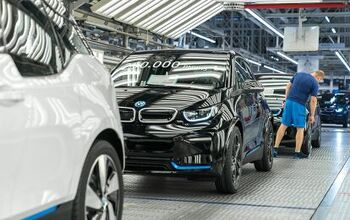Mercedes-Benz Abandons Manual Transmission, Sticks With Streamlining

As the manual transmission gradually joins the wheel-mounted throttle lever in the automotive history trash bin, we’ve been wondering which manufacture would be the next to take a bold stance against be-clutched vehicles. Today we have our answer, thanks to a tweet explaining the brand’s research boss had indicated Mercedes-Benz doesn’t have room for manuals in its current restructuring program.
“The head of @MercedesBenz’s R&D operations, Markus Schaefer, has confirmed the company will ‘eliminate manual transmissions’ as part of cost-cutting initiatives that will also see a ‘substantial reduction in platforms’ and a ‘very dramatic reduction in combustion engines,'” automotive journalist Greg Kable explained via social media on Tuesday.
Trying to consolidate models onto fewer platforms isn’t much of a shocker either. Mercedes-Benz actually opened the year by stating that it would be reducing the number of cars, engines, and platforms available to customers to ensure it had enough money to transition into an electric automotive brand. “We are reviewing our product portfolio, especially as we announced so many pure EVs,” Schafer said in March. “Knowing the complexity after the growth in the last couple of years means we are definitely reviewing our current lineup. The idea is to streamline — taking car variants out, but also platforms, powertrains, and components.”
Schafer said that, while Daimler’s plan was not to eliminate V8 and V12 engines from the Mercedes lineup, the company would ultimately have to utilize four-cylinder engines at a much higher frequency — especially if its ultimate goal is to prioritize EV sales moving forward. Meanwhile, the number of platforms the company uses should shrink immensely, leaving a few bases upon which to build the majority of its vehicles from. While this will undoubtedly save the brand a mint that can be reinvested into costly EV development, it kind of makes it sound like the next generation of internal combustion cars are going to be virtually identical to each other with tepid powertrain and sizing options being the only items setting them apart.
[Image: Franz12/Shutterstock]

A staunch consumer advocate tracking industry trends and regulation. Before joining TTAC, Matt spent a decade working for marketing and research firms based in NYC. Clients included several of the world’s largest automakers, global tire brands, and aftermarket part suppliers. Dissatisfied with the corporate world and resentful of having to wear suits everyday, he pivoted to writing about cars. Since then, that man has become an ardent supporter of the right-to-repair movement, been interviewed on the auto industry by national radio broadcasts, driven more rental cars than anyone ever should, participated in amateur rallying events, and received the requisite minimum training as sanctioned by the SCCA. Handy with a wrench, Matt grew up surrounded by Detroit auto workers and managed to get a pizza delivery job before he was legally eligible. He later found himself driving box trucks through Manhattan, guaranteeing future sympathy for actual truckers. He continues to conduct research pertaining to the automotive sector as an independent contractor and has since moved back to his native Michigan, closer to where the cars are born. A contrarian, Matt claims to prefer understeer — stating that front and all-wheel drive vehicles cater best to his driving style.
More by Matt Posky
Latest Car Reviews
Read moreLatest Product Reviews
Read moreRecent Comments
- Lorenzo People don't want EVs, they want inexpensive vehicles. EVs are not that. To paraphrase the philosopher Yogi Berra: If people don't wanna buy 'em, how you gonna stop 'em?
- Ras815 Ok, you weren't kidding. That rear pillar window trick is freakin' awesome. Even in 2024.
- Probert Captions, pleeeeeeze.
- ToolGuy Companies that don't have plans in place for significant EV capacity by this timeframe (2028) are going to be left behind.
- Tassos Isn't this just a Golf Wagon with better styling and interior?I still cannot get used to the fact how worthless the $ has become compared to even 8 years ago, when I was able to buy far superior and more powerful cars than this little POS for.... 1/3rd less, both from a dealer, as good as new, and with free warranties. Oh, and they were not 15 year olds like this geezer, but 8 and 9 year olds instead.


































Comments
Join the conversation
Nobody wants three pedals, everybody wants three rows.
Did Mercedes even sell sticks anytime recently in the USA? I’m telling you this rush to EVs and 4 cylinders is going to leave a trail of destruction. The EU can mandate whatever they want (they’re good at that). Then when lots of damage is done they’ll have a shocking revelation that you can’t make people desire or buy things they don’t want and change course. After billions thrown into the furnace and probably a few auto companies going out of business. The other danger is that if you’ve got 4 cylinder hybrids.... so does everyone else. What special reason do I have to buy a Mercedes at this point? The Ford 4 cylinder hybrid system is probably just as good or better than Mercedes. Smoother. Lasts longer. Better MPG. Part of what makes something luxurious is that it has features not available in pleb models. Am I supposed to believe some higher resolution iPads and some fancy inside lighting and a Star on the hood are enough of a luxury differentiator to pay 50% more? To be clear this is not a problem exclusive to Mercedes. BMW has also nearly lost all of the magical things that built its brand. You can ride your image for awhile but eventually people ask “why am I buying this again? What is so special about this that makes it worth this price?” (See Cadillac starting in the 1980s).